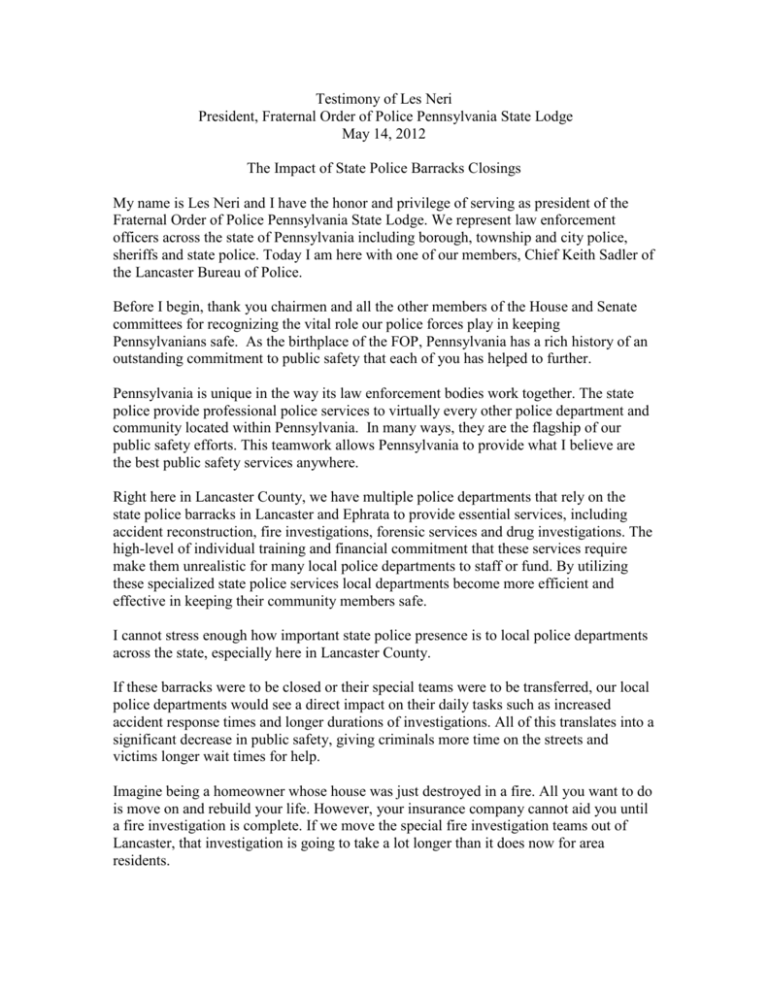Les Neri - Law & Justice Committee
advertisement

Testimony of Les Neri President, Fraternal Order of Police Pennsylvania State Lodge May 14, 2012 The Impact of State Police Barracks Closings My name is Les Neri and I have the honor and privilege of serving as president of the Fraternal Order of Police Pennsylvania State Lodge. We represent law enforcement officers across the state of Pennsylvania including borough, township and city police, sheriffs and state police. Today I am here with one of our members, Chief Keith Sadler of the Lancaster Bureau of Police. Before I begin, thank you chairmen and all the other members of the House and Senate committees for recognizing the vital role our police forces play in keeping Pennsylvanians safe. As the birthplace of the FOP, Pennsylvania has a rich history of an outstanding commitment to public safety that each of you has helped to further. Pennsylvania is unique in the way its law enforcement bodies work together. The state police provide professional police services to virtually every other police department and community located within Pennsylvania. In many ways, they are the flagship of our public safety efforts. This teamwork allows Pennsylvania to provide what I believe are the best public safety services anywhere. Right here in Lancaster County, we have multiple police departments that rely on the state police barracks in Lancaster and Ephrata to provide essential services, including accident reconstruction, fire investigations, forensic services and drug investigations. The high-level of individual training and financial commitment that these services require make them unrealistic for many local police departments to staff or fund. By utilizing these specialized state police services local departments become more efficient and effective in keeping their community members safe. I cannot stress enough how important state police presence is to local police departments across the state, especially here in Lancaster County. If these barracks were to be closed or their special teams were to be transferred, our local police departments would see a direct impact on their daily tasks such as increased accident response times and longer durations of investigations. All of this translates into a significant decrease in public safety, giving criminals more time on the streets and victims longer wait times for help. Imagine being a homeowner whose house was just destroyed in a fire. All you want to do is move on and rebuild your life. However, your insurance company cannot aid you until a fire investigation is complete. If we move the special fire investigation teams out of Lancaster, that investigation is going to take a lot longer than it does now for area residents. The same response-time increase would be true for traffic accidents that require an accident reconstruction team. Roadways would remain closed for much longer until the special team from the state police arrived and completed their task. These longstanding partnerships between the state police and local departments have been forged because they work. Over the years they have increased the efficiency and effectiveness of our public safety officers and the safety of all Pennsylvanians. Without these strong partnerships, we would not have the high-quality public safety that we have exhibited for so many years. The current low levels of state police are already demonstrating a burden on my members across the state. Every police department across the state is struggling under increased workloads due to the rise in crime during tough economic times, new duties associated with natural gas drilling and severe budget cuts that lead to understaffing. If we continue to throttle the vital assistance that state police provide to local departments, we will put our families, friends and neighbors in great danger. Again, I want to thank the committee chairs for giving me this opportunity and for the committee members giving us their attention to this critical issue. I will now turn my time over to Chief Sadler.








